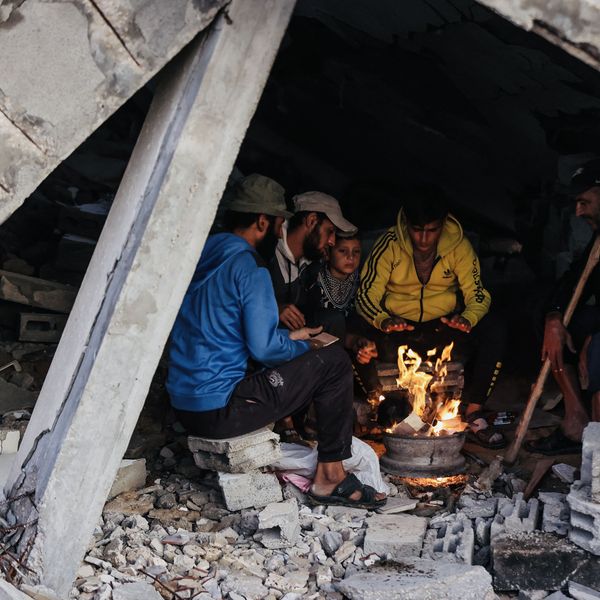Israel OKs 1100 New Buildings in East Jerusalem
Construction of 1,100 housing units cleared, despite Palestinian demands for settlement freeze to renew peace talks.
Israel's government has granted the go-ahead for construction of 1,100 new housing units in illegally occupied east Jerusalem, raising already heightened tensions fuelled by last week's Palestinian move to seek full UN membership.
Israel's interior ministry said on Tuesday that the homes would be built in Gilo, a Jewish enclave in southeast Jerusalem. It said construction could begin after a mandatory 60-day period for public comment, a process that is largely a formality.
The Palestinians claim east Jerusalem as their future capital. They have demanded that Israel halt all settlement construction in east Jerusalem and the adjacent occupied West Bank - territories captured and illegally occupied by Israel since1967 - as a condition for resuming peace talks.
Israel says all of Jerusalem, home to Jewish, Muslim and Christian holy sites, is part of its capital and will not be divided.
Saeb Erekat, the chief Palestinian negotiator, swiftly condemned the Israeli decision, saying it amounted to "1,100 no's to the resumption of peace talks."
He urged the United States, Israel's closest and most important ally, to change its position and support the Palestinians in their quest for UN membership.
With peace talks stalled for the past three years, the Palestinians last week asked the UN to recognise an independent Palestinian state in the West Bank, east Jerusalem and Gaza Strip.
The US opposes the measure and has vowed to veto the request in the Security Council. Like Israel, the US says a Palestinian state can only be established through negotiations.
In an interview published Tuesday, Israeli Prime Minister Binyamin Netanyahu said he would not freeze settlement construction again.
Speaking to the Jerusalem Post, he said that a 10-month moratorium on new construction last year failed to yield results. He said he saw no need for another freeze.
Netanyahu says negotiations should begin without any preconditions.
'Counterproductive'
The European Union's chief diplomat on Tuesday lamented Israel's green-light to expand the Gilo settlement and urged the government to reverse its decision.
"It is with deep regret that I learned today about the decision to advance in the plans for settlement expansion in east Jerusalem, with new housing units in Gilo," said Catherine Ashton, EU foreign policy chief.
"This plan should be reversed. Settlement activity threatens the viability of an agreed two-state solution and runs contrary to the Israeli-stated commitment to resume negotiations," Ashton told the European parliament.
She recalled that the Quartet of Middle East peacemakers - the EU, Russia, the UN and the US - have pleaded with Israelis and Palestinians to "refrain from provocative actions" if talks are to resume.
Richard Miron, spokesman for UN Mideast envoy Robert Serry, said the Israeli decision was "very concerning'' and ignored the Quartet's appeal.
"This sends the wrong signal at this sensitive time,'' he said.
Meanwhile, Hillary Clinton, US secretary of state, called Israel's decision to expand its settlement "counterproductive".
An Urgent Message From Our Co-Founder
Dear Common Dreams reader, The U.S. is on a fast track to authoritarianism like nothing I've ever seen. Meanwhile, corporate news outlets are utterly capitulating to Trump, twisting their coverage to avoid drawing his ire while lining up to stuff cash in his pockets. That's why I believe that Common Dreams is doing the best and most consequential reporting that we've ever done. Our small but mighty team is a progressive reporting powerhouse, covering the news every day that the corporate media never will. Our mission has always been simple: To inform. To inspire. And to ignite change for the common good. Now here's the key piece that I want all our readers to understand: None of this would be possible without your financial support. That's not just some fundraising cliche. It's the absolute and literal truth. We don't accept corporate advertising and never will. We don't have a paywall because we don't think people should be blocked from critical news based on their ability to pay. Everything we do is funded by the donations of readers like you. Will you donate now to help power the nonprofit, independent reporting of Common Dreams? Thank you for being a vital member of our community. Together, we can keep independent journalism alive when it’s needed most. - Craig Brown, Co-founder |
Israel's government has granted the go-ahead for construction of 1,100 new housing units in illegally occupied east Jerusalem, raising already heightened tensions fuelled by last week's Palestinian move to seek full UN membership.
Israel's interior ministry said on Tuesday that the homes would be built in Gilo, a Jewish enclave in southeast Jerusalem. It said construction could begin after a mandatory 60-day period for public comment, a process that is largely a formality.
The Palestinians claim east Jerusalem as their future capital. They have demanded that Israel halt all settlement construction in east Jerusalem and the adjacent occupied West Bank - territories captured and illegally occupied by Israel since1967 - as a condition for resuming peace talks.
Israel says all of Jerusalem, home to Jewish, Muslim and Christian holy sites, is part of its capital and will not be divided.
Saeb Erekat, the chief Palestinian negotiator, swiftly condemned the Israeli decision, saying it amounted to "1,100 no's to the resumption of peace talks."
He urged the United States, Israel's closest and most important ally, to change its position and support the Palestinians in their quest for UN membership.
With peace talks stalled for the past three years, the Palestinians last week asked the UN to recognise an independent Palestinian state in the West Bank, east Jerusalem and Gaza Strip.
The US opposes the measure and has vowed to veto the request in the Security Council. Like Israel, the US says a Palestinian state can only be established through negotiations.
In an interview published Tuesday, Israeli Prime Minister Binyamin Netanyahu said he would not freeze settlement construction again.
Speaking to the Jerusalem Post, he said that a 10-month moratorium on new construction last year failed to yield results. He said he saw no need for another freeze.
Netanyahu says negotiations should begin without any preconditions.
'Counterproductive'
The European Union's chief diplomat on Tuesday lamented Israel's green-light to expand the Gilo settlement and urged the government to reverse its decision.
"It is with deep regret that I learned today about the decision to advance in the plans for settlement expansion in east Jerusalem, with new housing units in Gilo," said Catherine Ashton, EU foreign policy chief.
"This plan should be reversed. Settlement activity threatens the viability of an agreed two-state solution and runs contrary to the Israeli-stated commitment to resume negotiations," Ashton told the European parliament.
She recalled that the Quartet of Middle East peacemakers - the EU, Russia, the UN and the US - have pleaded with Israelis and Palestinians to "refrain from provocative actions" if talks are to resume.
Richard Miron, spokesman for UN Mideast envoy Robert Serry, said the Israeli decision was "very concerning'' and ignored the Quartet's appeal.
"This sends the wrong signal at this sensitive time,'' he said.
Meanwhile, Hillary Clinton, US secretary of state, called Israel's decision to expand its settlement "counterproductive".
Israel's government has granted the go-ahead for construction of 1,100 new housing units in illegally occupied east Jerusalem, raising already heightened tensions fuelled by last week's Palestinian move to seek full UN membership.
Israel's interior ministry said on Tuesday that the homes would be built in Gilo, a Jewish enclave in southeast Jerusalem. It said construction could begin after a mandatory 60-day period for public comment, a process that is largely a formality.
The Palestinians claim east Jerusalem as their future capital. They have demanded that Israel halt all settlement construction in east Jerusalem and the adjacent occupied West Bank - territories captured and illegally occupied by Israel since1967 - as a condition for resuming peace talks.
Israel says all of Jerusalem, home to Jewish, Muslim and Christian holy sites, is part of its capital and will not be divided.
Saeb Erekat, the chief Palestinian negotiator, swiftly condemned the Israeli decision, saying it amounted to "1,100 no's to the resumption of peace talks."
He urged the United States, Israel's closest and most important ally, to change its position and support the Palestinians in their quest for UN membership.
With peace talks stalled for the past three years, the Palestinians last week asked the UN to recognise an independent Palestinian state in the West Bank, east Jerusalem and Gaza Strip.
The US opposes the measure and has vowed to veto the request in the Security Council. Like Israel, the US says a Palestinian state can only be established through negotiations.
In an interview published Tuesday, Israeli Prime Minister Binyamin Netanyahu said he would not freeze settlement construction again.
Speaking to the Jerusalem Post, he said that a 10-month moratorium on new construction last year failed to yield results. He said he saw no need for another freeze.
Netanyahu says negotiations should begin without any preconditions.
'Counterproductive'
The European Union's chief diplomat on Tuesday lamented Israel's green-light to expand the Gilo settlement and urged the government to reverse its decision.
"It is with deep regret that I learned today about the decision to advance in the plans for settlement expansion in east Jerusalem, with new housing units in Gilo," said Catherine Ashton, EU foreign policy chief.
"This plan should be reversed. Settlement activity threatens the viability of an agreed two-state solution and runs contrary to the Israeli-stated commitment to resume negotiations," Ashton told the European parliament.
She recalled that the Quartet of Middle East peacemakers - the EU, Russia, the UN and the US - have pleaded with Israelis and Palestinians to "refrain from provocative actions" if talks are to resume.
Richard Miron, spokesman for UN Mideast envoy Robert Serry, said the Israeli decision was "very concerning'' and ignored the Quartet's appeal.
"This sends the wrong signal at this sensitive time,'' he said.
Meanwhile, Hillary Clinton, US secretary of state, called Israel's decision to expand its settlement "counterproductive".

